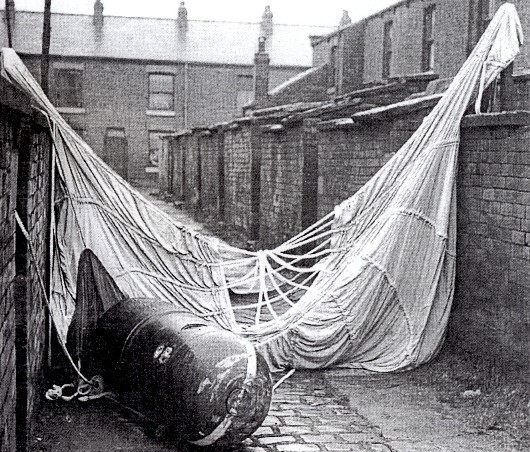Parachute mine, Oldham.
‹ Return to Air raids & bomb sites

Parachute mine, Oldham, 23 December 1940
Not a scene from the Coronation Street Christmas Disaster Special, this is a German parachute mine which fell on Oldham during the height of the Manchester Blitz, December 23rd 1940 and thankfully didn’t explode. Had it done so, everything in this view would have been completely destroyed.
The location is the back alley between Castleford Street and Wakefield Street looking towards Lime Street. It is very close to Oldham Athletic Football Club and Royal Oldham Hospital.
Please see here for the composite.
This link takes you to Google Maps Street View.
maps.google.co.uk/maps?hl=en&ll=53.551776,-2.132447&a…
Image © Greater Manchester Police Museum & Archives. Used with kind permission.
Wow – what a find – glad they’re not around now … !
Glad you posted that second pic Ian , I know the councils are short of money but failing to move a mine after all these years was taking the P.
Great research Ian , presumably this one never went off and was diffused successfully .
That would be a pretty scary sight to come across~
OMG can you imagine going out the back yard and finding this.
The scene hasn’t changed much so I guess it never went off.
Great couple of photos and some lucky escapes!
Glad the before and after are in that order
You just can’t imagine what it was like in those days
Crikey, bet they found a use for that chute though.
Cheers all. Aye that fabric would’ve come in handy. Would take a brave soul tho!
Amazing! I love then and now shots as well.
That alley hasn’t changed to much has it.What bloody thing to drop out of the sky !
That thing’s huge! Strange to drop it with a parachute…what’s the reason for that?
—
Seen on your photo stream. (?)
[http://www.flickr.com/photos/25949002@N06/]
Good question. Easier to quote that fountain of all knowledge, wikipedia;
Blast effects. These mines were attached to parachutes to act as blast bombs; when detonated at roof level rather than on impact the aerodynamic effects of their blast were maximised. Instead of the shock waves from the explosion being cushioned by surrounding buildings, they could reach a wider area, with the potential to destroy a whole street of houses in a 100 m (330 ft), with windows being blown in up to 1.6 km (0.99 mi) away.
If you look at that other photo, that’s a mine that had no parachute so the kinetic energy of the falling bomb meant it ended up nearly 30 feet under ground (bear in mind it was meant to detonate before it reached that depth). Using/not using parachutes enabled different patterns of destruction.
Oucha! That’s a helluva piece of ordnance that is and I certainly wouldn’t like to have been the chap who had to defuse it. Plenty silk drawers from that parachute I expect!
Very nice shot! Compliments!!
fantastic work
That was a near thing for those who lived thereabouts. I also assume that this was defuzed successfully and rendered harmless.
[http://www.flickr.com/photos/60188340@N04] I know, can you imagine coming out of the air raid shelter and seeing that bloody thing there!
Fantastic work again Ian – matching up the old and new photos. Have to admire the bravery of the service men who defused the unexploded ordnance left after the bombing raids.
I believe my father stood watched over this mine he was in the L.D.V. until the regulars came on the scene.
Wouldn’t have wanted to be in his shoes.
And our half sister cleared away the remains of the Abbeyhills bomb. Rita said this was when her hair turned white.